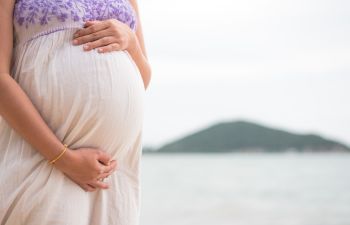
Understanding the risks and considerations for women considering childbearing in their 30s and 40s.
The data from the U.S. Centers for Disease Control indicates that birth rates for women in their 30s are at their highest levels in four decades, while birth rates for women in their 20s are slowing down. “While there are many legitimate reasons to postpone pregnancy, this is not the best choice for everyone. As a society, we must remain mindful of the modest increase risk of infertility and pregnancy complications as women age” Dr. Kort says.
“Such a critical life decision to get pregnant, and when to do so, is incredibly personal and involves different factors for each woman and/or couple,” explains Dr. Kort, who is fellowship-trained in reproductive endocrinology and infertility. “But for women over 30, these choices can be complicated by the passing years. The good news is, the vast majority of pregnancies in women over 30 end with a healthy baby and a healthy mom.”
Conceiving in your 30s
Simply put, it’s not as easy to become pregnant after 30 as it is before, Dr. Kort notes. But that doesn’t mean the news is all dire. “The majority of women conceive without fertility assistance in their 30s, with estimates ranging from 70-85%,” he says.
Staying pregnant is also more difficult after age 30, with the miscarriage rate increasing over the next decade and beyond. “Most miscarriages result from chromosomal abnormalities in the fetus, and the chance of this increases as women age,” he explains. “But every pregnancy carries the risk of miscarriage, and most women in their 30s carry their pregnancies to term.”
“These modest risks don’t typically stop most women in this age range from becoming pregnant or having a healthy baby,” Dr. Kort adds. “They are merely factors that must be kept in mind on the successful path to motherhood.”
Health risks balanced by rewards.
The risk of certain pregnancy complications increases in women over 30, especially those in their late 30s, Dr. Kort explains. These include:
- Premature labor and/or birth
- Preeclampsia, which involves a life-threatening spike in blood pressure
- Gestational diabetes
- Cesarean (surgical) delivery
So too do health risks rise to babies born to women over 30. These include:
- Genetic abnormalities, such as Down syndrome
- Low birth weight
- Complications related to prematurity
When weighing the risks and rewards of childbearing after 30, Dr. Kort says, most women opt to go ahead and fulfill their dreams of having a baby.
“Women over 30 can take several key steps to optimize their health and that of their baby despite the risks,” he adds. “By seeking regular prenatal care, eating a healthy diet, staying active, gaining weight wisely and learning about appropriate prenatal tests, would-be mothers can use their age to their advantage by educating themselves on a healthy pregnancy and the many ways they can contribute to a great outcome.”
Neway Fertility is one of New York’s leading fertility centers specializing in customized and effective fertility treatments.
Daniel Kort, MD, is a double board-certified obstetrician/gynecologist and reproductive endocrinologist and is associate medical director of Neway Fertility in New York City.
Posted on behalf of

